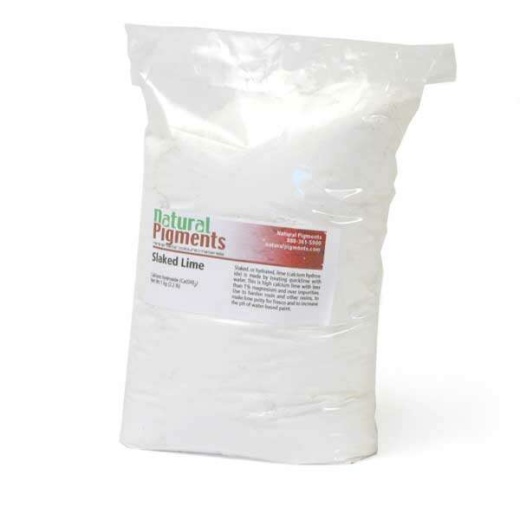Calcium hydroxide, traditionally called slaked lime, hydrated lime, or pickling lime, is a soft white powder obtained when calcium oxide (called lime or quicklime) is mixed or "slaked" with water. The name of the natural mineral is portlandite. A suspension of fine calcium hydroxide particles in water is called milk of lime. The solution is called lime water and is a medium-strength base that reacts violently with acids and attacks many metals in the presence of water. It turns milky if carbon dioxide is passed through the solution due to the precipitation of calcium carbonate.
This is Type S hydrated lime, as defined by ASTM C 206 and ASTM C 207, which was coined because the hydrated lime was considered to be "Special." Its special qualities include high early plasticity, high water-retentivity, limited oxide content, and a minimal coarse fraction. These properties enhance the performance of both mortar and plaster.
This lime is ideal for making lime putty, milk paint, and limed rosin or liming other resins. After washing with water to remove impurities, it can also neutralize free fatty acids and remove water from unrefined drying oils, such as cold-pressed raw linseed oil. Use caution because it is very alkaline and has high pH in water, which can irritate the skin and eyes.
StorageKeep in a tightly closed container, stored in a cool, dry, ventilated area. Protect the container against physical damage. Isolate from incompatible substances. Containers of this material may be hazardous when empty since they retain product residues (dust, solids); observe all warnings and precautions listed for the product.
Health and SafetyWear impervious protective clothing, including boots, gloves, lab coat, apron, or coveralls, to prevent skin contact. Use chemical safety goggles and a full face shield where dusting or splashing of solutions is possible.
Dust irritates the respiratory tract. Symptoms may include coughing and shortness of breath. It can cause chemical bronchitis. Ingestion may be followed by severe pain, vomiting, diarrhea, and collapse. Corrosive. Skin and eye contact may produce severe irritation and pain. Refer to Material Safety Data Sheet.
Environmental HazardsThis product is not known to be toxic to fish and aquatic organisms. If the product is spilled, comply with Federal, State, and local regulations on reporting spills. Refer to Material Safety Sheet and labels for further details.
| Typical Properties | |
| Chemical Name: | Calcium Hydroxide |
| Chemical Formula: | Ca(OH)2 |
| CAS No.: | 1305-62-0 |
| 325 Mesh (%): | 98% |
| Color: | Soft white powder |
| Physical Properties | ||
| Property | Specification | Test Method |
| Finer than 325 Mesh | 92% minimum | MCLO-72 |
| Calcium (CaO) Equivalent, % | 74.5% typical | ASTM C1271-99 |
| Magnesium, % | 0.40 maximum | ASTM C1271-99 |
| Moisture, % | 1.0 maximum | MCLO-43 |
| Total Calcium Hydroxide (Ca(OH)2) Assay, % | 95.0 minimum | ASTM C1271-99 |
